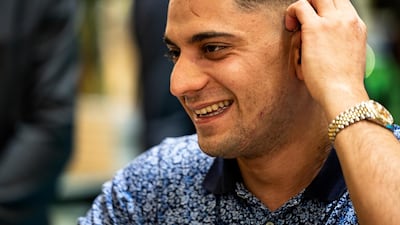A trailblazing Danish-Palestinian poet who rallied against extremism in his works has died at the age of 24.
Yahya Hassan made history as a teenager when his first published poems sparked controversy and led to a public debate on Denmark’s freedom of speech.
His works challenged Muslim extremism and saw him met with death threats and even led to him being attacked by a convicted terrorist.
The talented poet was found dead at his home in Denmark last week and police say there are no suspicious circumstances.
His publisher Simon Pasternak described him as “brilliant”.
"Yahya Hassan was twenty-four years old. Twenty-four. Which is nothing, of course – and this is a catastrophe," he told The National.
"I’ve known him since he was 16, this brilliant boy with a tremendous talent, always on edge, yet with the sleepwalker-like assurance that great talent brings.
"The insistence on having his own voice, defending his territory, finding his own place – in spite of what people thought. Yahya refused to bend for anyone.
"He didn’t want to represent anyone or be exploited. He wanted to be himself and write the poems he wanted – with the enormous costs that entailed. Now he is dead. It is unbearable.”
The poet, who had a history of mental health issues, published just two collections, his most renown is his self-titled book Yahya Hassan in 2013, which was the best-selling debut poetry collection in Denmark.
It sold more than 120,000 copies.
The books courted controversy and led to him needing police protection after some of his poems criticised the actions of Muslims from his childhood ranging from extremist views to benefit fraud, domestic abuse and their integration into Danish society.
The son of Muslim Palestinian immigrants, he had grown up in a ghetto in Denmark’s second largest city Aarhus.
His experience of racial abuse and intolerance inspired his works and he was a strong critic of any kind of extremism.
"I despise right-wing populist politicians. Just as I despise right-wing Muslims,” he had previously said in an interview.
“Fascists are always fascists. But at the same time, I claim the right to express my opinion through poetry.
"Danish Muslims live in disadvantaged areas, where unfortunately there are many problems. If I talk about it, they accuse me of generalising about Muslims. But they are the ones who generalise about themselves."
"Death threats and violence are unfortunately part of our society, they certainly didn't start with my book. I'm only sorry that many educated and capable Muslims do not rebel against all this."
Literary commentator Julie Wetterslev said Denmark has lost “an important voice”.
“Yahya Hassan was an immense and intense poetic force,” she said.
“He was an angry and a gifted poet who used his own pain to criticise child abuse, fanatacism and misogyny, but his critique of Muslim societies and of his own family came from a place of love.
“He understood better than anyone how abuse and mistreatment and racism and global injustice fosters violence and rage, he was such an important voice in Denmark, perhaps the most important. And now he is dead.”
It was the cancellation of one of his readings by a library, due to death threats, that led to a parliamentary debate on Islamist threats impinging on the freedom of speech in Denmark.
Police do not think the death threats he has previously received have a role in his death.
“There is currently nothing in our investigations to suggest that there has been a criminal act,” a police spokesperson said.
His latest collection, Yahya Hassan 2, was released last November and has been nominated for the Nordic Council Literature Prize.
Member of the Nordic Council Literature Prize Committee, Lise Vandborg, says he has left a legacy for the world.
“Yahya Hassan has had a huge impact on Danish literature,” she told broadcaster DR.
“The debut collection was read by many people who did not normally read poems. In this way, Yahya Hassan, like no other Danish poet in recent times, has led the general public to read and discuss poems.
“His two collections of poems, I think, will remain in the history of literature.”
Dr Claire Chambers, a senior lecturer in Global Literature at the University of York, said literature has lost an "honest voice".
"I was stunned to learn of Yahya Hassan's untimely death," she told The National.
"Danish and European literature has lost an outspoken, sometimes controversial, but always honest voice from a poet of Palestinian Muslim heritage."
When he was asked five years ago how he imagined his future, he replied: "I don't imagine it. I only think of living in the present."


